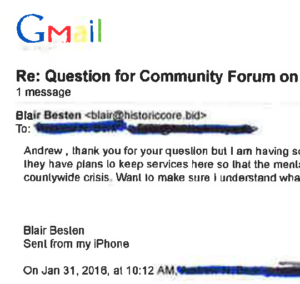

And, as you can see, for whatever reason, Blair Besten has made a dedicated pseudonymous email address for responding to CPRA requests. It’s publicrecords@historiccore.bid, and she and her flunky Paola Flores use it interchangeably.3 This turn to pseudonymity seems to be a common instinct amongst those feeling hassled by their duties under CPRA. South Park has done it, the HPOA has done it, CD4 did it, and even the City of Los Angeles has flirted with the idea. It’s important for the sake of maximizing interhuman communicativity to identify one’s correspondents and converse with them under their actual names. Fortunately for the sake of meeting this goal, CPRA actually forbids anonymity under some circumstances. Take a look at §6253(d), which states in pertinent part:4
The notification of denial of any request for records required by Section 6255 shall set forth the names and titles or positions of each person responsible for the denial.
And of course, it’s a general principle of the science of the reading of laws that nothing gets in there by accident.5 If the state legislature decided to require deniers to reveal their names and titles it’s because a lot of deniers wanted not to reveal them. So these BIDdies and their instinctual turn to anonymity must be in some sense a widespread phenomenon. Which makes it all the more crucial to press them on the issue. Thus, on receiving the above linked-to redacted stuff, I fired off an email to Blair Besten, stating:
Good afternoon, Blair.
I notice that someone at HCBID redacted two names and some corporate affiliations from the emails you just sent me. Can you please state the specific exemptions to CPRA that were relied on to withhold this information and can you please tell me the name(s) and title(s) of the person or persons who made the decision to redact that information, as is also required by CPRA? Alternatively you could just tell me the two names.
Thanks for your help and cooperation!
And fewer than 24 hours later, which for Blair Besten in the context of CPRA is essentially immediate, she replied thusly:
Exemption:
– Benefit does not outweigh burden
– Discloses personal information
– Reasonable right to privacy
Made by Blair Besten ED
So it’s good that she identified herself, but it’s bad that she essentially made up exemptions and, because she made them up, was not able to cite specific, enumerated exemptions from the actual law. This is another one of those use-or-lose aspects of the CPRA. One must always press one’s clients6 on this issue. Hence time for yet another email:
Thanks, Blair.
Can you please cite actual sections of the law? I think I can tell from this what exemption(s) you’re invoking, but before I ask you to reconsider I’d like to be sure.
Thanks again,
And then came Blair Besten’s final answer:
The BID has opted to redact as permitted under CA govt code 6253(a) and in this circumstance has redacted personal contact info because of the public interest in nondisclosure outweighs the public interest served by the disclosure, pursuant to CA govt code 6255.
In case you’re interested, this is mostly unmitigated bullshit, but unfortunately it’s the kind of unmitigated bullshit that’s just trivial enough so that economic considerations militate against contesting it, which is yet another reason why this state, or at least this freaking City, needs some kind of intermediate level of disputation for CPRA questions. Well, of course, we all get the Muni Code we deserve, don’t we? Anyway, there’s no point to this story. It’s just another slice of life on the front lines of….I don’t even know what…
Image of Blair Besten is © Roy Lichtenstein, I don’t know what year.
- This is exacerbated by the unfortunate fact that in the City of Los Angeles the only way to get recalcitrant agencies to comply is by suing them. Sadly, we are having to do a little of this, but one can only afford so many lawyers at a time. Recalcitrant BIDs, take note, though! We have not yet hit our limit, so keep those documents flowing, please.
- They don’t use the C-word, because what they like to refer to as “best practices” tell them not only not to, but probably also to use person-first language, so that they will talk about, e.g., “persons experiencing unhousedness in addition to mental health challenges not known as the C-word” or some such circumlocution. But, as a wise man once said, you can tell the evil lying sons of bitches by how they act rather than by how they talk. Thus I feel fairly safe attributing the use of the C-word to these folks, whether they actually let themselves use it or not.
- You can pretty reliably tell them apart by textual analysis. Paola writes, at least for now, like a human being. Blair Besten writes like a rageball on the verge of either a dangerous breakdown or a dangerous series of lashing-out episodes. Paola reuses subject lines like a normal person. Blair Besten goes out of her way, it seems, to not-so-passive aggressively alter them.
- This phrase, “in pertinent part,” is one of my all-time favorite lawyerisms. Thanks, friends, for thinking of that!
- It’s extra-interesting to keep this principle in mind when reading laws against, e.g., bestiality. It really spices up the observation that some states have such laws while other states never found it necessary to pass them. Why is that, one wonders? Alabama, Mississippi, we’re looking at you!
- I am going to be calling people “clients” of whom I request records under CPRA going forward. It sounds so professional, doesn’t it?
